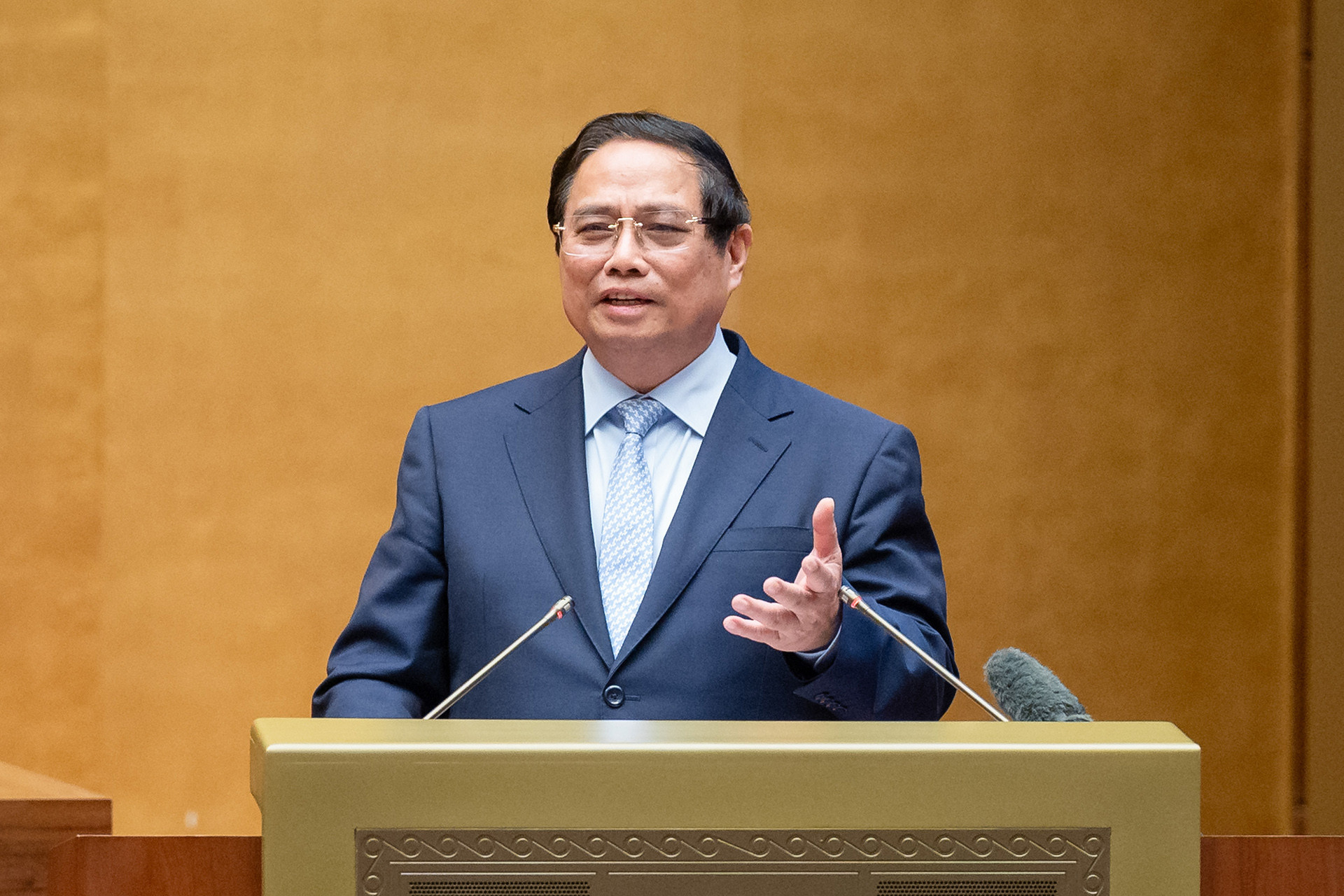Prime Minister Pham Minh Chinh emphasized that while achieving rapid growth is crucial, it must also be sustainable. "If we maintain only average growth, we risk falling into the middle-income trap," he said. Although the goal of double-digit growth is extremely challenging, the Prime Minister asserted, "we must make it happen."

This morning, the Politburo and the Party Secretariat held a national conference to disseminate and implement the resolution of the 11th Plenary Session of the 13th Central Committee of the Communist Party of Vietnam.
Prime Minister Pham Minh Chinh presented a special report on draft documents for the upcoming 14th Party Congress.
‘AI created by us must not defeat us’
Addressing the new aspects of the draft political report, the Prime Minister highlighted the fast-paced development of the Fourth Industrial Revolution, particularly artificial intelligence (AI). He stressed the urgency of keeping AI in check, stating that the most important goal is "not letting the AI we create end up defeating us."
The current term has also seen substantial investment in national defense and security, which the Prime Minister described as groundbreaking. He noted that virtual and real-world spaces are now indistinguishable - "what exists in the real world also exists online." Therefore, ensuring cybersecurity and protecting sovereignty in both domains are essential.
Initially, the government set a growth target of 6.5-7%, but later realized that this would make it difficult to meet the two strategic development goals for 2030 and 2045. Thus, a revised target of over 8% has been established as a foundation to achieve double-digit growth in subsequent years.
The Central Committee agreed that the private sector remains the most important driver of national economic development. The Prime Minister recommended that this position be formally added to the upcoming congress documents.
Avoiding the middle-income trap
Reflecting on the renewal (Doi Moi) journey over the past 40 years, the Prime Minister said that Vietnam had transformed significantly - from a war-torn country with a GDP of just 4 billion USD to more than 470 billion USD in 2024, with a forecast of 510 billion USD by 2025. GDP per capita has risen from over 100 USD to more than 4,700 USD today.
He acknowledged the nation’s historic achievements but cautioned against complacency, stressing that the road ahead remains difficult. "Since the beginning of this term, no year has been free of challenges," he said, citing COVID-19, global conflicts disrupting supply chains, natural disasters, and trade wars.
Despite this, the Prime Minister confirmed a firm commitment to the main targets for the 2026–2030 period, including an average GDP growth of 10% per year, per capita GDP of approximately 8,500 USD by 2030, labor productivity growth of about 8.5% annually, and an average total investment of 40% of GDP over five years.
He outlined 12 major tasks focused on institutional reform and building a two-tiered local government system.
Strategic direction for a changing world
In the current context, the Prime Minister noted, Vietnam faces both difficulties and opportunities. Therefore, strategic foresight and accurate assessment are vital.
He reiterated the consistent guidance of General Secretary To Lam, particularly the need to eliminate institutional bottlenecks. "We must decisively abandon the mindset of ‘if we can’t manage it, ban it’ and ‘managing what we don’t understand.’ We must fully unleash the forces of production," he said.
A core part of this strategy is building an independent and self-reliant economy that can withstand external shocks. Given current export challenges, the government is pushing for growth driven by domestic consumption and investment.
He reaffirmed his resolve, saying, "Double-digit growth is very challenging, but we have no choice - we must achieve it."
Driving new growth through reform
On restructuring administrative apparatuses at all levels, the Prime Minister said the top priority is to open up new spaces for development. Vietnam’s rapid, sustainable growth must rely on emerging drivers such as the green economy, digital economy, circular economy, and creative economy.
Accordingly, public administration must shift from a passive role to actively serving the people, with local governments becoming more connected and responsive to citizens' needs.
Administrative reform must continue, he added, by cutting intermediaries, streamlining procedures, and promoting digitalization. "Digitizing procedures will reduce the need for personnel, travel, and costs while speeding up resolution times," he concluded.
Tran Thuong